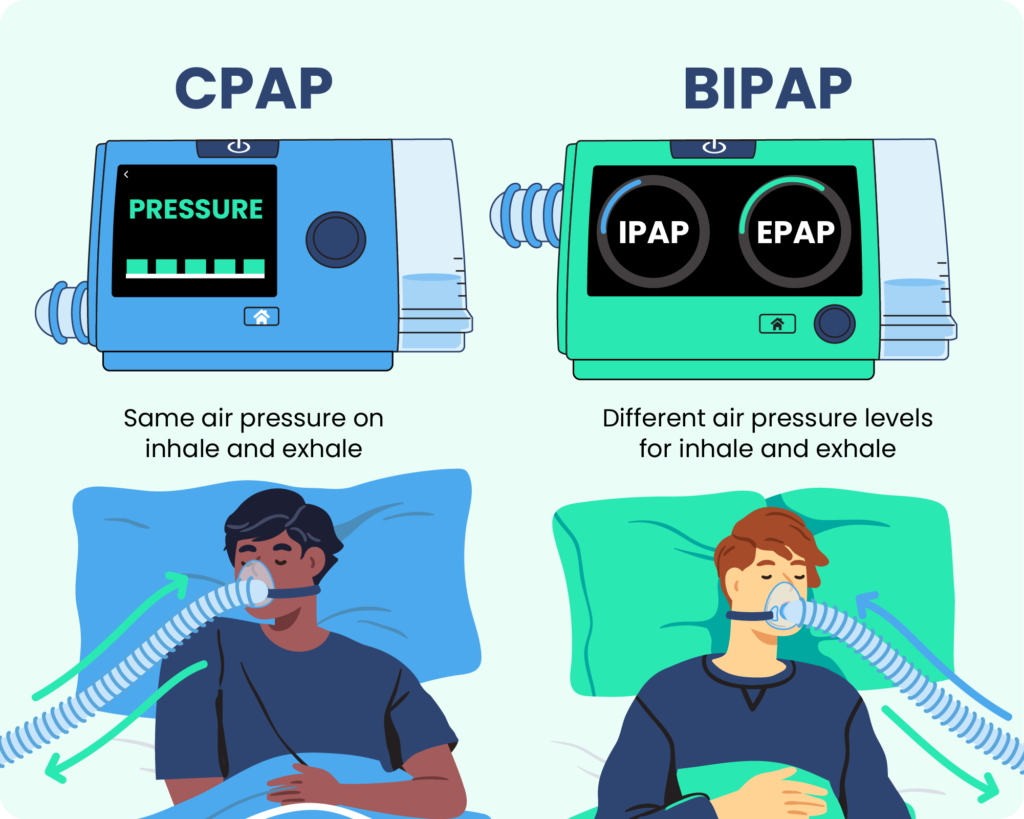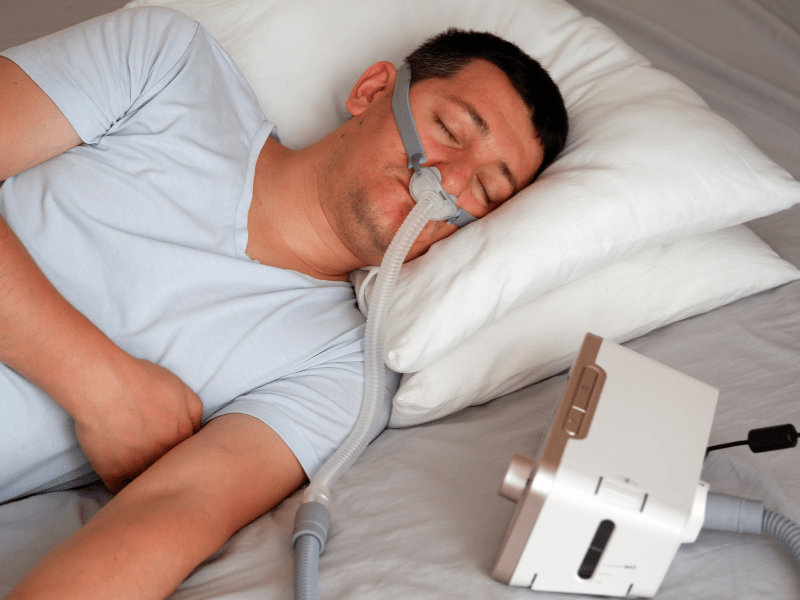BiPAP Rental: A Cost-Effective Alternate to Acquiring
BiPAP Rental: A Cost-Effective Alternate to Acquiring
Blog Article
Bipap vs. CPAP: Which Is the Ideal for Your Sleep Condition?
When browsing the complexities of rest problems, the selection between BiPAP and CPAP therapy is an important consideration. Each method uses unique advantages tailored to certain conditions, yet the decision hinges on specific client requirements and comfort levels. While CPAP provides a constant air flow appropriate for obstructive sleep apnea, BiPAP's twin pressure setups may improve comfort for those with even more elaborate respiratory issues. Understanding these differences can substantially impact therapy efficacy, leaving one to ponder which option really aligns with their wellness requirements and way of life.
Comprehending Sleep Disorders
Sleep disorders incorporate a variety of conditions that interfere with typical rest patterns, impacting both the high quality and duration of remainder. These problems can materialize in numerous forms, consisting of sleeplessness, rest apnea, narcolepsy, restless leg disorder, and parasomnias. Each problem provides one-of-a-kind difficulties, frequently bring about substantial daytime exhaustion, cognitive disability, and psychological disruptions.
Sleeping disorders is defined by difficulty dropping or staying asleep, while sleep apnea involves repeated interruptions in breathing throughout rest, frequently resulting in fragmented remainder. Narcolepsy, on the various other hand, is noted by too much daytime drowsiness and abrupt rest attacks. Restless leg syndrome causes uncomfortable experiences in the legs, prompting an irrepressible impulse to move them, which can also impede the ability to drop off to sleep.
The effect of sleep problems expands beyond individual wellness, influencing general performance, connections, and top quality of life. Understanding the particular nature of each condition is crucial for effective medical diagnosis and treatment. As sleep health comes to be increasingly acknowledged as an essential part of overall wellness, addressing these disorders is essential for improving both sleep high quality and everyday performance.
Exactly How CPAP Functions
Continuous Positive Airway Pressure (CPAP) therapy is regularly used as a main treatment for obstructive rest apnea (OSA) The mechanism of CPAP entails the use of a maker that delivers a steady stream of air with a mask used throughout sleep. This air movement keeps favorable pressure in the respiratory tract, avoiding the collapse or obstruction of the throat that can occur during rest.
When a client takes a breath in, the CPAP machine supplies a constant circulation of air, making certain that the airway stays open - BiPAP Rental. This not just reduces the symptoms of OSA, such as snoring and disrupted rest patterns, but likewise lowers the affiliated health and wellness risks, consisting of cardio complications and daytime exhaustion
The pressure settings on a CPAP equipment can be personalized to fulfill private person needs, typically figured out through a rest research. People typically go through titration studies to locate the optimum pressure level for their special problem. Normal follow-up and modifications might be needed to make sure effectiveness and comfort. Generally, CPAP treatment has actually been shown to significantly improve the top quality of sleep and total health and wellness for people enduring from obstructive rest apnea.
Just How BiPAP Works
BiPAP, or Bilevel Positive Airway Pressure, is a specific form of non-invasive ventilation that is discover here particularly beneficial for clients with problems such as complicated sleep apnea or respiratory system problems. Unlike CPAP, which provides a continual stream of air at a solitary stress, BiPAP provides 2 distinct pressure settings: a higher inspiratory pressure for breathing and a lower expiratory pressure for exhalation. This dual-pressure technique enables less complicated breathing, reducing the effort needed during exhalation.
The device operates through a mask fitted over the nose or mouth, linked to a maker that produces air pressure. When the client inhales, the equipment provides the greater stress to help with airflow, ensuring that the airway continues to be open. Upon exhalation, the equipment immediately lowers the stress, making it much more comfortable for the person to take a breath out.

Key Differences In Between BiPAP and CPAP

In contrast, BiPAP (Bilevel Favorable Airway Stress) supplies two various pressure settings: one for breathing and a reduced one for exhalation. This double stress system enables even more comfy breathing, particularly for clients who deal with exhaling against a constant stress. BiPAP is typically advised for clients with intricate sleep apnea, chronic obstructive lung illness (COPD), or those who call for added assistance during sleep.
Furthermore, the intricacy of BiPAP tools generally causes a higher price and requires a lot more cautious titration than CPAP. BiPAP Rental. Comprehending these key differences can assist in recognizing which gadget may be preferable for details sleep disorders, setting the foundation for informed therapy choices
Picking the Right Treatment
The decision between BiPAP and CPAP therapy largely hinges on the certain attributes of the sleep condition, the client's total wellness, and their convenience with the gadget. CPAP, which delivers a continuous stream of air, is typically suggested for obstructive rest apnea (OSA)
On the other hand, BiPAP offers 2 levels of stress: one for breathing and a lower one for exhalation. This twin pressure system is valuable for people with complicated sleep apnea or those that experience difficulty breathing out against a continual stress. Additionally, BiPAP is frequently recommended for individuals with respiratory system conditions, such as chronic obstructive lung disease (COPD), where varying stress setups can enhance convenience and compliance.
Inevitably, a complete assessment by a rest specialist, including a rest research study, can aid identify which treatment lines up best with the individual's needs. Elements such as convenience, ease of usage, and certain clinical conditions must additionally be taken into account to enhance therapy outcomes.
Verdict
In summary, both BiPAP and CPAP offer distinctive objectives in the management of sleep problems. CPAP works for obstructive rest apnea through regular air flow, while BiPAP supplies double stress settings that boost comfort for those with complex rest apnea or breathing concerns. The choice between these therapies ought to be guided by specific needs and conditions, necessitating an extensive evaluation by a rest professional to ensure ideal therapy end results and boosted top quality of sleep.

In general, CPAP treatment has actually been shown to dramatically improve the high quality of rest and total health for individuals suffering from obstructive sleep apnea.
BiPAP is usually recommended for basics clients with intricate sleep apnea, persistent obstructive pulmonary disease (COPD), or those who need extra assistance throughout rest.
CPAP is reliable for obstructive rest apnea with regular air movement, while BiPAP offers dual pressure setups that improve comfort for those with complicated sleep apnea or breathing concerns.
Report this page